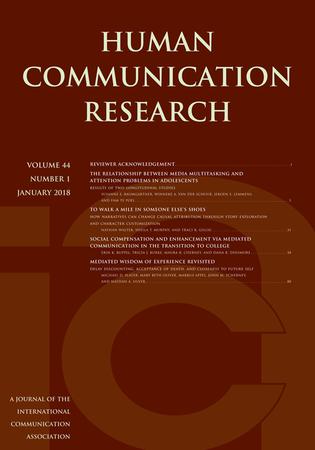Partisan YouTube use and evaluation of knowledge in Korea and the United States: a fresh perspective via the Dunning–Kruger effect
IF 3.3
1区 文学
Q1 COMMUNICATION
引用次数: 0
Abstract
This study investigates how partisan YouTube use can paint biased evaluations of one’s own as well as others’ knowledge. Understanding of these relationships is enriched by a fresh theoretical perspective via the Dunning–Kruger effect, suggesting that people, especially those who perform poorly, tend to overestimate their own competence. Using South Korea and the United States as two different contexts, we also attend to how cultures moderate these relationships. Findings based on two independent surveys in these countries shed light on the role of partisan YouTube use in shaping people’s hyperbolic self-evaluations and contrasted assessments of in- and out-group members. Furthermore, these trends are more pronounced among those with relatively a low level of actual knowledge. Finally, using partisan YouTube for news is strongly associated with group-based evaluations of knowledge in Korea, whereas it yields significant relationships only with self-evaluations of knowledge in the United States.韩国和美国的党派YouTube使用和知识评估:邓宁-克鲁格效应的新视角
这项研究调查了YouTube的党派使用是如何对自己和他人的知识进行有偏见的评估的。通过邓宁-克鲁格效应(Dunning-Kruger effect),一种新的理论视角丰富了对这些关系的理解,该理论表明,人们,尤其是那些表现不佳的人,往往高估了自己的能力。将韩国和美国作为两个不同的背景,我们还将关注文化如何调节这些关系。基于在这些国家进行的两项独立调查的发现,揭示了YouTube的党派使用在塑造人们夸张的自我评价以及对群体内外成员的对比评价方面所起的作用。此外,这些趋势在那些实际知识水平相对较低的人群中更为明显。最后,在韩国,使用党派YouTube获取新闻与基于群体的知识评估密切相关,而在美国,它只与知识的自我评估产生显著关系。
本文章由计算机程序翻译,如有差异,请以英文原文为准。
求助全文
约1分钟内获得全文
求助全文
来源期刊

Human Communication Research
COMMUNICATION-
CiteScore
8.20
自引率
2.00%
发文量
28
期刊介绍:
Human Communication Research is one of the official journals of the prestigious International Communication Association and concentrates on presenting the best empirical work in the area of human communication. It is a top-ranked communication studies journal and one of the top ten journals in the field of human communication. Major topic areas for the journal include language and social interaction, nonverbal communication, interpersonal communication, organizational communication and new technologies, mass communication, health communication, intercultural communication, and developmental issues in communication.
 求助内容:
求助内容: 应助结果提醒方式:
应助结果提醒方式:


